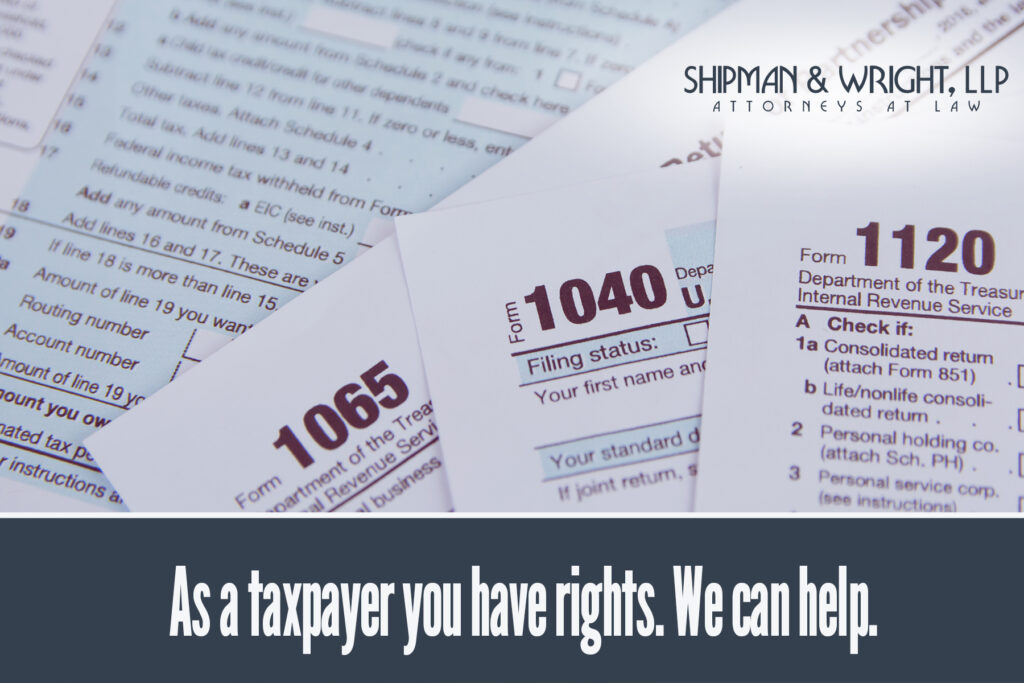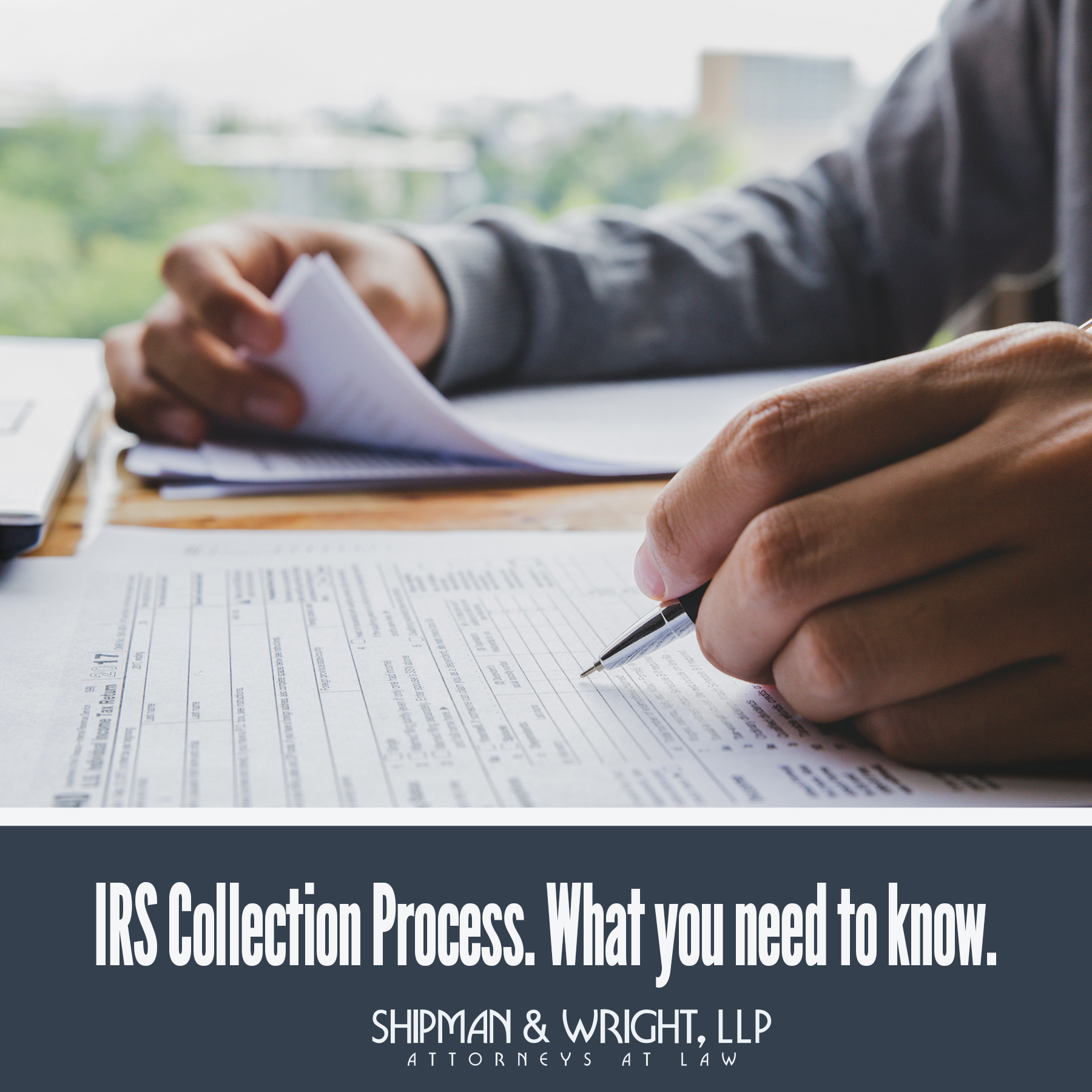Written By Attorney Joshua MacNamara
IRS COLLECTION PROCESS
The Internal Revenue Service collection process can be complicated to understand and navigate on your own. If you’ve received a notice, letter, or bill…take a breath…and don’t panic.
You will be surprised to learn the IRS, contrary to what most people believe, is well organized and structured for the efficient administration and resolution of tax issues. Internal Revenue Officers are highly skilled and trained to collect delinquent unpaid taxes and penalties…notices, letters, and assessments should not be ignored.
What you may not know is the Revenue Officer has the authority to consider alternatives for you to resolve tax matters…this can include setting up payment arrangements, when appropriate, granting relief from penalties, and even suspending collections due to financial hardship such as a loss of a job or medical issues.
RIGHTS AS A TAXPAYER – YOU HAVE THEM!
In addition, you have many rights as a taxpayer. However, the most important thing you can do is make certain you preserve them. When you receive a notice, letter, or bill…TIME IS OF THE ESSENCE in responding to the IRS or NCDOR. Often, you must respond within thirty (30) days from the date of the notice to preserve your rights to contest what is raised by the IRS or NCDOR. After, thirty (30) days, ways to resolve tax matters take a different course. With the help of Shipman & Wright, LLP we can help you explore PATHWAYS FORWARD and work with the IRS and NCDOR to discuss possible tax relief options so you can focus on your day-to-day, family, and operating your business.
TYPES OF TAX RELIEF FROM THE IRS COLLECTIONS PROCESS
Following, are some of the types of tax relief options that can be explored…
OFFER IN COMPROMISE (OIC)
– A form of tax settlement for less than the full amount of the balance due.
Generally, there are three (3) different basis Offers in Comprise can be considered by the IRS depending on the circumstances. They include:
- Doubt as to liability
- Doubt as to collectability
- To promote effective tax administration
We help you evaluate whether this is an argument that can be made, examine the best options, and help you determine the best pathway to submit the Offer in Compromise while representing you through this difficult and time-consuming process.
- CURRENTLY NOT COLLECTIBLE STATUS (CNC)
– A temporary delay in the collection where the IRS places your account in this status due to financial hardship.
As an alternative to the Offer in Compromise, a CNC may be granted by the IRS to halt collections. However, this does not mean the debt goes away.
A CNC may be granted when facing financial hardship or other general hardship and you find yourself unable to pay the taxes and penalties. This status allows an opportunity to breathe while working toward formulating a reasonably manageable solution to resolve the liability.
- EXTENSION OF TIME TO PAY DUE TO UNDUE HARDSHIP
- A postponement of payment request resulting from undue hardship
The IRS defines “undue hardship” as something more than an inconvenience and requires a showing payment of the tax creates a substantial financial loss. We can help determine if you have a valid basis to request this form of relief and present this to the IRS.
- PARTIAL PAY INSTALLMENT AGREEMENTS (PPIA)
– A payment plan
PPIA is a form of hardship relief and a payment plan. PPIA may be allowed if you can demonstrate a hardship. If a valid hardship exists, the IRS will assist in formulating a reasonable and manageable payment plan.

- FEDERAL TAX LIEN & APPEALS
– The IRS will file a Federal Tax Lien to secure its interest against your property as security for a tax debt.
The IRS will seek a tax lien when three (3) things occur:
- The IRS assesses the liability;
- Notice and Demand for Payment is sent
- You fail to or refuse to pay within ten (10) days of notification
Depending on the amount of the lien and value of the property, the IRS may release a lien if a valid basis exists and is presented to the IRS.
We help determine if the appeals process is appropriate to challenge a tax lien and whether the filing of the lien was appropriate. We can explore if a Collections Due Process hearing is in order and assist in working through the appeals process.
Once the case is assigned to the IRS Office of Appeals, which operates as an independent office, Appeals will review the case and issue a determination as to whether the filing of the lien was appropriate and fair, and may also review any additional information to resolve balances owed. Should the determination not be favorable, and if appropriate, we can assist in seeking review in U.S. Tax Court.
IRS LEVY – RELEASE
- The IRS levy is a legal seizure of property to satisfy tax obligations and penalties.
A levy remains in effect, often for ten (10) years, until the debt is paid, or other arrangements can be made.
Levies can be made against bank accounts and banks must comply with the IRS levy by placing an initial hold on the account for 21 days, allowing you to make arrangements with the IRS before the bank is required to remit the account funds to the IRS.
During this 21-day period, we can assist you in working out payment, negotiating relief arrangements, or releasing with the IRS, by determining whether the levy is appropriate, and appealing the levy if necessary. Additionally, the IRS is not permitted to levy certain types of property. For example, unemployment benefits, certain annuities, pensions, disability, and workers’ compensation payments as well as school books, personal effects, etc. up to certain amounts.
IRS WAGE LEVY / GARNISHMENT – RELEASE
– Garnishment of earned wages from your paycheck
The IRS may issue a Wage Levy or Wage Garnishment to the employer. When this occurs, the IRS may take a significant amount of take-home pay, to certain limits, after regular taxes are withheld and can be continuous. Arrangements and discussion of certain exemptions are possible, including appeal, where the IRS may issue a release of the levy.
PAYROLL & EMPLOYMENT TAXES – DEBT RESOLUTION
– Compliance with filing obligations is mandatory
Often, businesses require assistance with filing compliance relating to the tax type owed and with reporting requirements to provide accurate financial status to the agency. We can assist with and work toward requesting a resolution with the IRS and NCDOR to allow continued operation of the business and work with you to mitigate Trust Fund Recovery Penalties.
TRUST FUND RECOVERY PENALTY (TFRP)
- The TFRP penalty can be equal to 100% of the tax not paid and is charged to the Individual owner of the business and any responsible parties. The amount of the penalty is equal to and in addition to the tax owed by the Business.
Businesses at the beginning of financial problems sometimes do not remit these payments and it can become a death spiral for the business. In some instances, can rise to the level of criminal action(s).
The Trust Fund Recovery Penalty (TFRP) may apply when taxes, such as withheld income, employment (FUTA), social security (FICA) are not deposited with the Fed / State. When the IRS determines the taxes haven’t been paid by willful acts of the business and those responsible, the penalty can be equal to the full amount (100%) of the unpaid tax, in addition to penalties and the tax not paid.
When the IRS determines the business is unable to pay the tax, it will determine what individuals were in a position of authority (CFO, Manager, Accountant, etc.) and acted willfully making them responsible in addition to the business.
CORPORATION REVIVAL
– Corporations, LLCs & Business Entities
The Secretary of State will suspend Corporations, LLCs and other business entities when Corporate formalities are not fulfilled or when there is delinquency with State Tax filings or delinquent tax payments. When this occurs, steps can be taken to revive the entity by working through compliance matters. Often, it will require certain filings, re-filings, and compliance arrangements.
PENALTY ABATEMENT
- A form of forgiveness
In certain instances, the IRS may forgive penalties for late filings, or late payments of tax when the surrounding circumstances are reasonable. The IRS has also expanded the abatement of penalties when someone has a history of timely filings and timely payments. Some options include:
- First Time Penalty Abatement
- Reasonable Cause as a Basis for Relief
- Death, Serious Illness, Unavoidable Absences
- Inability to Procure Necessary Records
- Reliance on incorrect/inaccurate professional advice
- Other
AUDIT DEFENSE & REPRESENTATION
Businesses going through an IRS audit will find it to be a lengthy & difficult process that interrupts business operations. IRS Audits involve inspection of business records to make sure past tax filings accurately reflect the reported income and expenses.
When served with notice of an audit, you are permitted to be represented by an attorney and DO NOT NEED TO APPEAR in the early stages, if at all, if the matter is resolved and does not escalate.
TAX COURT PETITIONS & OFFICE OF APPEALS – REQUESTS FOR REVIEW
The IRS will finalize changes during an audit and issue a Notice of Deficiency. The Taxpayer has ninety (90) days to make a petition to the tax court if they disagree with the changes and collections will be suspended during the process.
INNOCENT SPOUSE RELIEF
– When you did not reasonably know about your spouse’s actions giving rise to your liability
Innocent Spouse Relief is a form of relief that may be available if the spouse did not know and did not reasonably know their spouse was not reporting income (gambling debts, side cash business, accounting accurately), or took fraudulent and/or excessive deductions. The innocent spouse may be relieved of liability depending on the individual circumstances.
INJURED SPOUSE RELIEF
– When all or a portion of your share of a refund from a joint return is applied to satisfy the separate obligation of your spouse
Relief in certain instances may be available from collection and potential recoupment of their share of a refund for liability owed BEFORE marriage and/or after legal separation relating to separate past due, tax debt, child support, or student loan debt.
AUTOMATED UNDER-REPORTED INCOME CP2000
– Income Not Included on the Original As Filed Tax Return
IRS notice CP2000 generates from the Automated Under-Reported (AUR) Department of the IRS when income is not included on the original “As Filed” tax return.
A CP2000 notice is computer generated based on a mismatch (income doesn’t match what was reported by the employer and/or 1099s). The IRS automatically adds the income, additional tax, interest & penalties.
In certain cases, the additional income may be excluded, or additional information may be submitted to explain the variance.
Penalty abatement may also be requested if relying upon the advice of a Tax Preparer, CPA, Enrolled Agent or Tax Attorney.
IDENTITY THEFT – MITIGATION OF DAMAGE
– Tax-Related Identity Theft: Personal Information Has Been Fraudulently Used
When this occurs, proper notifications can be made to the FTC, credit bureaus, and police, regarding identity theft.
In addition, IRS and NCDOR identity theft notices, affidavits, and form(s) can be completed on your behalf to help mitigate issues with the IRS / NCDOR.
PASSPORT REVOCATION – RETURN OF / DEFENSE TO
– IRS may report seriously delinquent taxes resulting in revocation of passport(s)
When taxes are “seriously delinquent”, IRC Section 7345 allows the IRS to notify the Secretary of State of the past-due tax obligation. When this occurs, the Department of State has the option of revoking or denying a passport application. Relief from this decision can be obtained by working with the IRS and determining whether the basis for the notice to the Department of State was appropriate as certain types of tax debt are excluded in calculating what is “seriously delinquent”.
PATHWAYS FORWARD
At Shipman & Wright, LLP we can help you understand your obligations, mitigate legal exposures, and resolve IRS collection issues. We navigate complex levels of legal procedure helping to create pathways forward. We focus on preventing the escalation of issues with the IRS and the North Carolina Department of Revenue (NCDOR) BEFORE they become bigger than then need to be…allowing you to focus on your day-to-day, family, and growing your business.
Joshua MacNamara
Attorney
Mitigation & Resolution
Shipman & Wright, LLP
Raleigh – Wilmington







